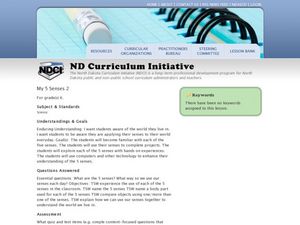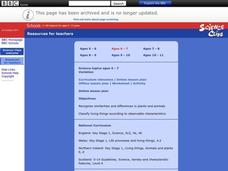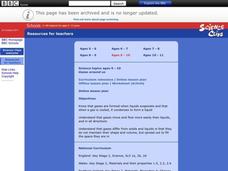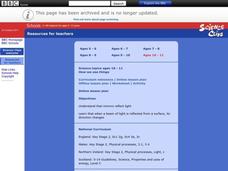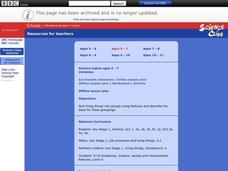Curated OER
Can rice plants talk?
First graders compare and contrast rice plants with people. In this rice plant lesson, 1st graders discuss what make rice plants similar to people such as their bodies and coverings. They also discuss how they are different in what they...
Curated OER
Animal Habitats
Students explore animal lifestyles by researching their characteristics. In this animal habitat lesson, students read the story Over in the Jungle and analyze the animal illustrations in the book. Students create clay animal characters...
Curated OER
My Five Senses 2
Students investigate the five senses. In this five senses lesson, students answer essential questions about the use of the five senses as they interact with their environment. They use a computer software program to make a concept web...
Curated OER
Tune Up Your Ears!
Students discuss meaning of pitch, listen for different sounds in classroom, hallway, and outdoors, and listen to sounds played on piano and on computer to determine high or low pitch.
Curated OER
Radiation from Space
In this radiation activity, students review the different types of radiation waves that come from space and the different telescopes used to detect this radiation. This activity has 17 true or false questions.
Curated OER
The State Of Wisconsin
Students investigate the state of Wisconsin and use sound to experience the concept differently. They listen to Native American songs of a tribe in the state. Also they listen to the frogs that live there in the classroom or out in the...
Curated OER
We the People
Students show how the meaning of the Preamble is reflected in current American culture. They collect images and/or sounds from media sources that represent, symbolize, or explain each phrase in the Preamble and create a media...
Curated OER
Ourselves
Young scholars use a website to name and compare external body parts of humans and other animals.
Curated OER
Moving and Growing
Learners know that humans and some other animals have bony skeletons inside their body. They know that other animals have skeletons on the outside of their bodies. They explain the role of both kinds of skeletons.
Curated OER
Circuits and Conductors
Pupils participate in an online lesson to explain the conductivity of different materials and the effect of changing the power source.
Curated OER
Variation
Students participate in an online lesson to reinforce the similarities and differences in plants and animals. They classify living things according to observable characteristics.
Curated OER
Gases Around Us
Students participate in an online lesson showing that gases are formed when liquids evaporate and that when a gas is cooled, it condenses to form a liquid, and gases move and flow more easily than liquids, and how gases differ from solids.
Curated OER
Changing State
Students participate in an online lesson plan to investigate the effects of cooling and heating on water.
Curated OER
Helping Plants Grow Well
Learners explain the effect of water, temperature and light on plant growth.
Curated OER
Micro-organisms
Students examine how micro-organisms are living organisms that are often too small to be seen. They explain that micro-organisms may be beneficial or harmful.
Curated OER
Forces in Action
Students ask questions that can be investigated scientifically. They determine how to plan a fair test by changing one factor while keeping other factors the same, to use measurements to draw conclusions and use scientific knowledge to...
Curated OER
How We See Things
Students explain that mirrors reflect light. They examine how when a beam of light is reflected from a surface, its direction changes.
Curated OER
Changing Circuits
Young scholars participate in an online instructional activity to explain how to make bulbs brighter or dimmer in a series circuit by changing the number or type of components.
Curated OER
Variation
Students practice sorting living things into groups using their characteristics. Using pictures of leaves and animals, they sort them based on their color and shape and write the objects characteristics under the picture. They share...
Curated OER
Keeping Warm
Young scholars place words describing a range from cold to hot on a scale. Using those words, they identify places on Earth which are cold, hot, freezing or boiling. They practice using and reading a thermometer with three different...
Curated OER
Moving and Growing
Students work with a partner to brainstorm a list of as many human body parts as possible. Using that list, they circle any one of those that are bones. They are shown a model of the human skeleton and practice locating various bones. ...
Curated OER
Keeping Healthy
Students review what the heart does and why the muscles in the body need oxygen. As a class, they measure their pulse rate while they are resting and after they have jogged for three minutes. They are helped by their teacher to convert...
Curated OER
Grouping and Changing Materials
Students feel and observe different types of materials. Using the internet, they sort objects based on the materials they are made from and justify their reasons for putting it in a certain category. They identify objects that could...
Curated OER
Using electricity
Students explore how a switch can be used to break a circut. Students construct a simple series circuit and use it for a purpose. Students read the "The Lighthouse Keeper's Lunch,or one of the "Katie Morag" stories which clearly shows...




